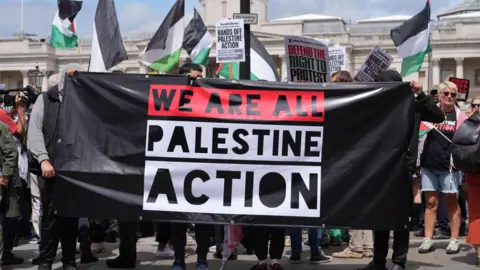In a significant move, members of Parliament (MPs) have recently approved a legislation that designates the activist group Palestine Action as a terrorist organization. The vote concluded overwhelmingly with 385 members in favor and only 26 opposing. This decision amends the Terrorism Act of 2000 and is anticipated to be signed into law by Home Secretary Yvette Cooper, with implementation expected later this week. Once the legislation takes effect, any support for Palestine Action will be regarded as a criminal act, with penalties for membership or advocacy reaching up to 14 years in prison.
Legal challenges are already underway, seeking to temporarily halt the implementation of this order. A hearing is scheduled at London’s High Court for this coming Friday. The legal action is being pursued to ascertain whether adequate grounds exist for a formal challenge against the proscription. Alongside Palestine Action, the legislation also targets other groups, notably the Maniacs Murder Cult, a white supremacist and neo-Nazi faction, and the Russian Imperial Movement, which espouses similar ideologies.
The impetus for this legislative action arose following a controversial incident in which members of Palestine Action allegedly broke into RAF Brize Norton, located in Oxfordshire, and vandalized two military aircraft with red paint. Prime Minister Sir Keir Starmer condemned the act, labeling it as disgraceful, which further fueled the calls for the group’s designation as a terrorist organization. The targeted actions have drawn the ire of government officials, including Minister of State for Security, Dan Jarvis, who described Palestine Action’s recent activities as increasingly aggressive and violent, encompassing actions against financial institutions, charities, and governmental offices.
Supporters of the proscription within Parliament argue that the group’s initiatives have strayed significantly from legitimate protest methods. Conservative MP Harriet Cross expressed that the groups under threat of proscription engage in activities devoid of any connection to peaceful or legal protests. However, not all politicians are in agreement with the decision to label Palestine Action as a terrorist organization. Several Labour Party backbenchers have expressed concerns, advocating that criminal legislation may provide a more proportionate response to the group’s activities instead of a blanket ban.
Included among the dissenting voices is Labour MP Clive Lewis, who emphasized the historical context of direct action in British democracy, a practice that he argues should not automatically be equated with terrorism. Similarly, Richard Burgon, another Labour MP, pointed out that the legislation could unjustly criminalize many individuals associated with the group, including a diverse array of volunteers such as students and healthcare professionals who support Palestine Action’s mission.
Despite the rising controversies surrounding this decision, the proscription order is now set to proceed to the House of Lords for further approval on Thursday, where it’s expected to pass. Meanwhile, Palestine Action continues to assert that their actions are in response to the ongoing violence and humanitarian crisis in Gaza, exacerbated by Israel’s recent military operations following the violent attacks by Hamas that occurred on October 7, 2023. Describing these developments, the health ministry in Gaza reported over 56,500 fatalities due to the conflict, illustrating the severe humanitarian implications tied to the regional strife.
This evolving situation illustrates not only the complexities surrounding national security and protest rights but also highlights the tense backdrop of international conflict that continues to shape the political landscape in the UK and beyond. The implications of this legislation will likely reverberate across civil rights discussions and raise critical questions about the boundaries of protest in democratic societies.











